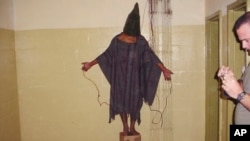20 years later, Abu Ghraib detainees win victory in U.S. court
Twenty years ago this month, photos emerged of tortured prisoners at Iraq’s Abu Ghraib prison and the smiling U.S. soldiers guarding them, shocking the world.
Now, three survivors of Abu Ghraib prison will finally sue in a U.S. court against the military contractors they believe were responsible for their abuse.
The trial, scheduled to begin Monday in U.S. District Court in Alexandria, will be the first time Abu Ghraib survivors will be able to present torture charges to a U.S. jury, said Baher Azmy, an attorney with the Center for Constitutional Rights. Representing the plaintiff.
CACI, a defendant in the civil suit, provided interrogators working at the prison. The Virginia-based contractor has denied any wrongdoing and emphasized in the 16-year lawsuit that its employees have not been accused of any abuse against any of the plaintiffs in the case.
However, the plaintiffs seek to hold CACI responsible for the conditions that led to their torture, citing evidence from a government investigation that CACI contractors instructed military police to “soften” detainees during interrogations.
Retired Army Gen. Antonio Taguba, who led the investigation into the Abu Ghraib prison scandal, is expected to testify. His investigation concluded that at least one CACI interrogator was liable for instructing military police to set conditions that amounted to physical abuse.
There is no doubt that the abuse is horrific. Photos released in 2004 showed naked prisoners stacked in pyramids or being dragged on leather straps. In some photos, a soldier poses next to a corpse, smiling and giving a thumbs up, or detainees are threatened by dogs or hooded and tied to wires.
The accusers cannot be clearly identified in the infamous images, but their descriptions of abuse are disturbing.
Suhail Al Shimari described the sexual assaults and beatings he suffered during his two months in prison. He was also given electric shocks and dragged around the jail with a rope tied around his neck. Salah Al-Ejaili, a former Al Jazeera reporter, said the pressure he was under caused him to vomit black liquid. He was also deprived of sleep, forced to wear women’s underwear and threatened with dogs.
However, CACI said the U.S. military is the agency responsible for setting conditions at Abu Ghraib and that its employees do not have the authority to issue orders to soldiers. Lawyers for the contractor group said in court documents that “the entire case is nothing more than an attempt to hold CACI PT accountable because the company’s personnel worked in war zone prisons and the atmosphere reeked of sordid activity. The law, however, does not Admitted links to Abu Ghraib prison.”
The case has been before the courts since 2008, and CACI has tried to have it dismissed about 20 times. In 2021, the U.S. Supreme Court ultimately rejected CACI’s appeal efforts and sent the case back to the district court for trial.
In one of CACI’s appeal arguments, the company argued that the United States had sovereign immunity from the torture charges and that CACI had derivative immunity as a contractor executing government tenders. But in a first-of-its-kind ruling, U.S. District Judge Leonie Brinkema ruled that the U.S. government cannot claim immunity from CACI when it comes to allegations of violations of established international norms, such as the torture of prisoners. . Claim any derivative immunity.
Jurors are also expected to hear testimony next week from some soldiers who were convicted in military courts of directly committing the abuse. Ivan Frederick, a former staff sergeant, was convicted by a court-martial of assault, indecent conduct and dereliction of duty and sentenced to more than eight years in prison. He gave testimony that is expected to be presented to the jury because he voluntarily refused to attend the trial. There was disagreement over whether his testimony proved the soldiers were working under the direction of CACI interrogators.
The U.S. government may present a wild card in the trial, which is expected to last two weeks. Both the plaintiffs and CACI complained that their cases were hampered by government claims that certain evidence, if released, would reveal state secrets and thereby harm national security.
Government lawyers said at a pretrial hearing on April 5 that they would be prepared to object at trial if witnesses strayed into what they considered state secrets.
Judge Brinkema, who has heard numerous complex national security cases, warned the government that if such privileges were asserted at trial, “it would be better if there were genuine state secrets.”
Government lawyer Jason Lynch assured her, “We’re doing everything we can to not get in the way of this.”
Of the three accusers, only Al-Ejali, who now lives in Sweden, is expected to testify in person. Two others will testify remotely from Iraq. Brinkema ruled that the reason they were sent to Abu Ghraib was irrelevant and would not be revealed to jurors. All three were released without being charged with any crime after being detained for periods ranging from two months to a year, according to court documents.
“Even if they were terrorists, that does not excuse the conduct alleged here,” she said during the April 5 hearing.
Follow us on Google news ,Twitter , and Join Whatsapp Group of thelocalreport.in




